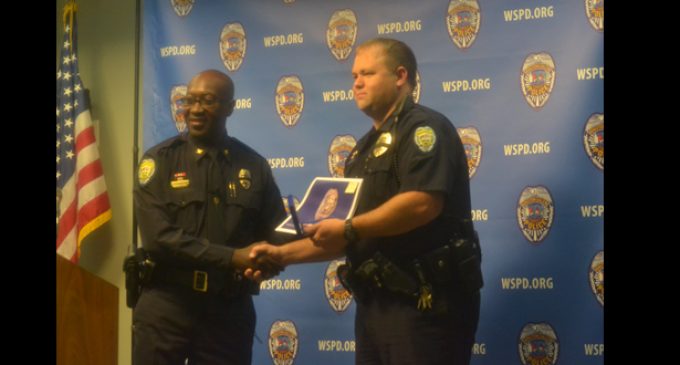African-American law enforcers react to Ferguson, NYC uproars

Above: Stephen Hairston and Glenn Bratton
As both a former Winston-Salem Police sergeant and Winston-Salem Branch NAACP president, Stephen Hairston sees the police-inflicted deaths of Michael Brown and Eric Garner and other black men through a unique prism.
Hairston retired from active police duty more than a decade ago; he now works as a WSPD background investigator. His NAACP presidency ended four years ago. Yet, when grand juries failed to bring indictments against the officer who killed Brown in Ferguson, Mo., and Garner in New York City, his phone began to ring incessantly.
“They want to protest and do something because they feel so powerless by what’s going on,” said Hairston, who says he has reassured callers Winston-Salem is not like Ferguson, or New York, for that matter.
Hairston said he understands the frustration. He, too, has been dismayed by the criminal justice system.
“I am hurt, embarrassed, and being a black person with a young black male, I’m worried. I’ve gone through all types of emotions,” he said. “I was disappointed in those cases in particular. I personally disagreed with the grand jury decision but I’m just one of millions.”
Glenn Bratton, a retired Gaston County Police officer who is president of the statewide black law enforcement group North State Law Enforcement Officers Association, said he has reserved judgment in the Brown and Garner cases, but says they have created an even wider rift between law enforcers and the community. He says developing proactive solutions is the answer.
“Anytime there’s violence and people are upset about something, it doesn’t help,” he said. “Hopefully, there are going to be some people that will be proactive in developing that relationship. There are a lot of things that are going to be done on both sides before that relationship can start to heal.”
Bratton said the public should try to understand that law enforcement officers are just but a small part of the overall criminal justice system. He believes at the root of some of the anger is the belief that police played a part in the grand jury process.
“A lot of people miss the point that even though the police are part of the criminal justice system; there is another side that has to be addressed also. People must remember that a different branch of the judicial system came back with a ‘non-indictment’ decision,” he said.
Law enforcement agencies, he said, must recommit to true community policing.
“The police are going to have to be aggressive and progressive in improving, not only community relationships, but the way they police in every neighborhood. There has to be some changes,” Bratton said.
Hairston agrees that community policing is the key to creating real connections between officers and the residents they are charged with serving.
“The community needs to see the person behind the badge, and the officers need to see the citizens behind the door,” he said. “You have to do more to foster a personal relationship. If you knew that person as a person, you wouldn’t treat them like an object and go overboard.”
Hairston said he knows from experience that if an officer builds community relationships, residents will have that officer’s back.
“I have gotten in struggles while working with the police department and I didn’t know where my help was going to come from or if the police department would get there in time. Before they got there, some citizens would help me. That’s from years of building that trust,” he said.
The National Black Police Association is also endorsing community policing as a solution. Malik Aziz, the agency’s president and deputy chief of the Dallas, Texas Police Department, said on CNN recently, “You have to either step up to the plate and believe in a real and true community policing philosophy or you get left behind.”
The Winston-Salem Police Department is planning to kick its community policing program up several gears by opening three neighborhood satellite police stations at University Parkway and North Point Boulevard, Hanes Mall Boulevard and Jonestown Road and in the Lucia Building on Waughtown Street.
Winston-Salem Police Chief Barry Rountree – Forsyth County’s highest ranking African-American law enforcer – did not respond to repeated requests for an interview for this story.
President Barack Obama recently asked Congress to approve $263 million to provide police departments with body cameras and training. Bratton said cameras could be helpful, but could also raise new issues.
“Nothing is going to be a cure-all, but (cameras) will definitely help because you are going to have more of a true picture about what happens at a particular incident,” he said. “Now how the supervisor and managers manage the footage and how they make determinations about what has happened will depend on the decision also.”











